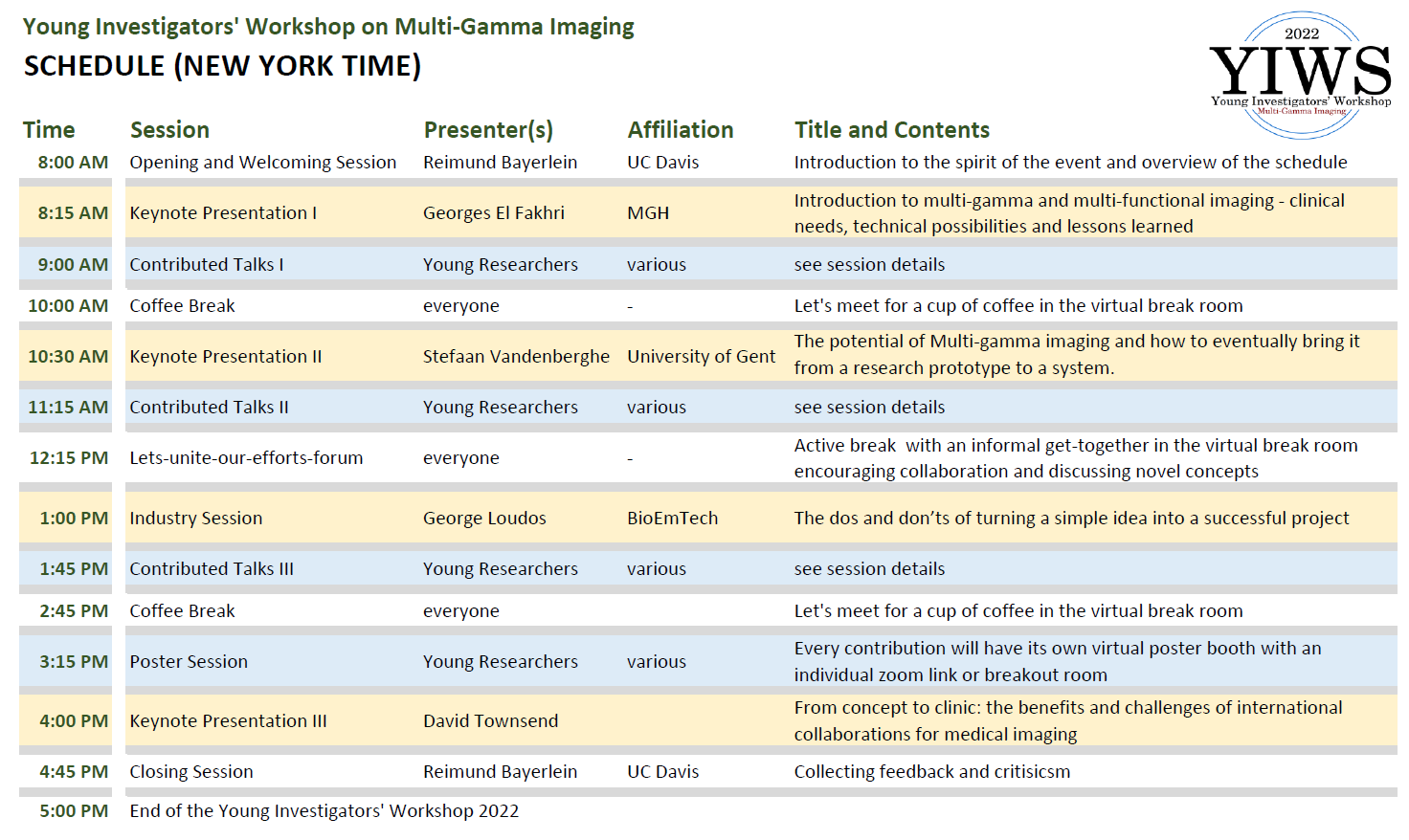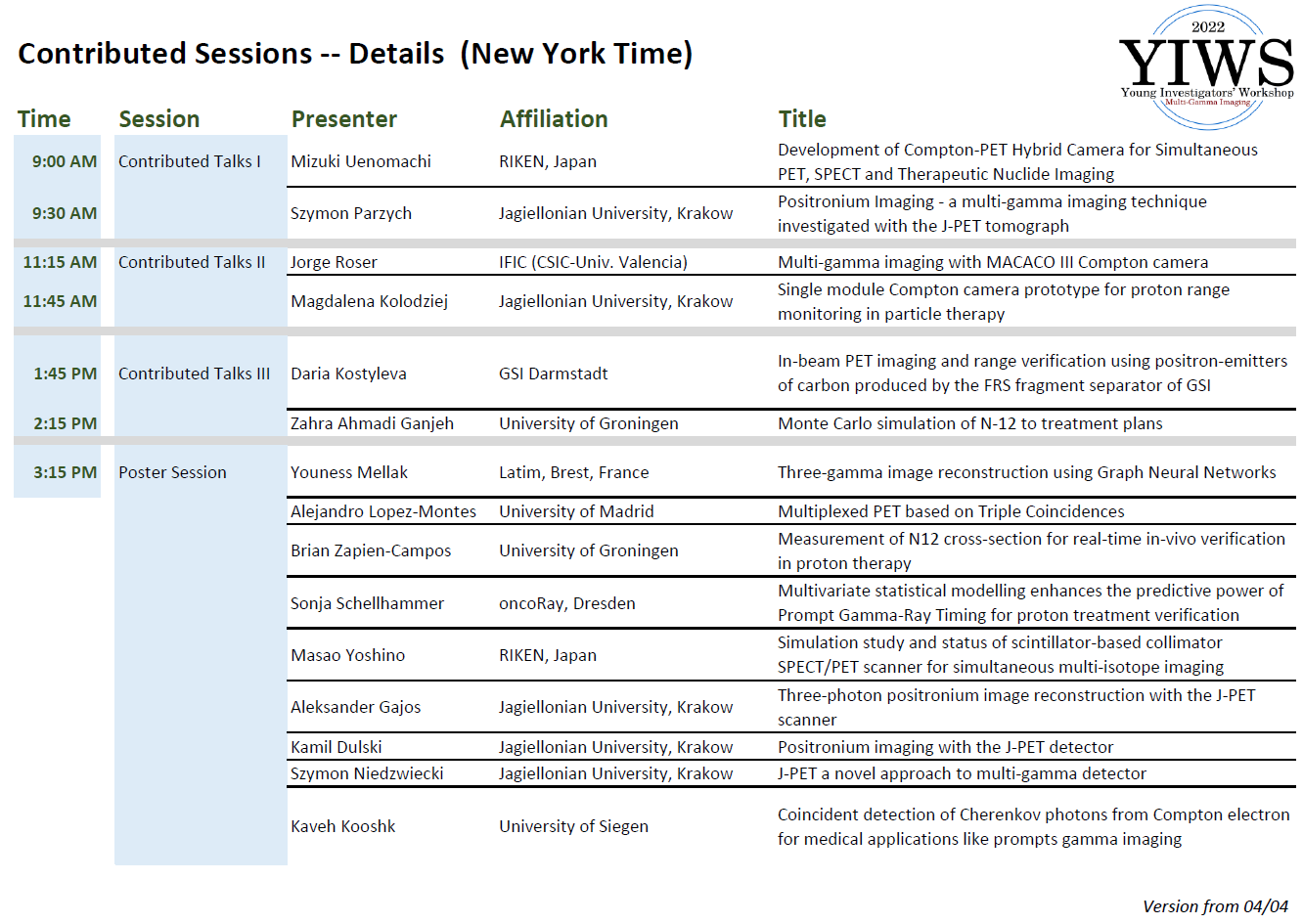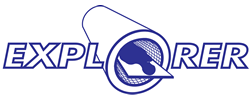Young Investigators' Workshop on Multi-Gamma Imaging

Young Investigators' Workshop (YIWS) 2022 - Flyer
At a glance
Purpose and Vision
Providing a platform for young researchers interested in open-minded discussions, international networking, and exchange of novel ideas and concepts.
Date and Time
Friday, April 22, 2022, 08:00 am – 05:00 pm, EDT (New York time)
Target Group
Young researchers from post-graduate level up to young project scientists working in the field of multi-gamma imaging
Abstract Deadline
Friday, February 25, 2022 11:59 pm, EDT
Please provide your abstract via email to the address listed below.
How to Attend
Send an email to the contact person below stating your name, affiliation and field of research and/or interest. Then you will be put on the email list and receive all necessary information.
Meeting Schedule
The meeting schedule (version 04/21) can be found here.
The detailed schedule for contributed talks and posters (version 04/04) can be found here.
Contact Person
Reimund Bayerlein, PhD, rbayerlein[AT]ucdavis.edu
linkedIn/rbayerlein
Invitation
The invitation can be found here. Please feel free to forward it to any potential participant. Thank you!
Support and Sponsoring
This workshop is supported by the German company MeetAnyway, who provides the online platform for this workshop without any costs.
Here you can find a short video with some explanations about this online platform with.
About this initiative
Background
Throughout the last decade there has been an increasing interest in developing nuclear imaging techniques capable of simultaneously visualizing multiple gamma emissions by including them in the detection and image reconstruction process – both in PET and SPECT. Primarily the interest is driven by the increasing demand for multi-tracer imaging. But also, image quality and sensitivity in PET could benefit from the possibility to use triple gamma events (i.e., a typical PET photon pair accompanied by a prompt gamma) or single gamma events (events, where only one of the two 511 keV PET annihilation photons is detected, which usually would render the event unusable for traditional reconstruction) in addition to typical PET-events with two approximately back-to-back emitted annihilation photons. A successful implementation of multi-gamma imaging will furthermore facilitate multi-tracer imaging in PET/SPECT, and that is of great interest to researchers using molecular imaging.
Also, gaining different types of imaging information using the same modality (like bolus distribution and perfusion in dynamic PET imaging), could also be considered "multi-gamma imaging". Another example would be the widely discussed use of energy discrimination for scatter correction or positron annihilation lifetime spectroscopy (PALS), as well as prompt gamma detection for proton range monitoring in particle therapy.
Thus, this research field is large and there is a lot of room (and need) for open discussions and exchange of information.
Goal of this Meeting
All over the world, many institutes and research groups have been investing in this field. However, the exchange of novel ideas and latest developments and especially the collaboration on exciting new concepts has been limited not least because of a competitive ambiance in the community. We strongly believe that especially young scientists will vastly benefit from the opportunity to meet with colleagues from their field and exchange information without limits.
Thus, our goal is to organize initially an informal gathering of all those researchers that have an interest in collaborating, global networking and collectively identifying the key challenges that need to be overcome in the field of multi-gamma imaging.
The vision of this meeting is to provide a platform for the exchange of information, for vivid upfront discussions, and for the creation of a common ground for future developments of this field.
Basic Framework
Forum: Online on Zoom and on meetanyway.com. See links and descriptions in the Organizing Matters below.
Contents:
- Introductory presentations from two of renowned researchers from the field as main speakers, envisaged to provide the initial stimulus to the discussions
- Selected contributing talks presented by young scientists. In contrast to many conferences, here, enough time will be allocated for discussions and to enable forming online future thematic collaborations
- Many open discussions and a “lets-unite-our-efforts” forum as a get-together
- Building a bridge between the lab and the clinical application with a representative from industry who will provide valuable information on the most common obstacles and how to overcome them
Impact and Outlook
After evaluation of its hoped-for success, we do hope that future meetings could be potentially held in person, or as hybrid events to increase participation, as the “return to normal” may take some time.
Participants' Contribution
Please consider this unique opportunity! We invite especially – but not exclusively – young investigators to contact us with comments and ideas related to this proposal. Participants are invited to contribute with short presentations. To apply for a talk, a brief abstract of about 5-7 sentences shall be provided to the contact person addressing one or several of the following key points, going beyond the present status stage:
- Current or new challenges in this field that have not been addressed yet
- New concepts to be presented and discussed
- New project to be formed for which collaborating partners are sought.
- …
Please also forward this invitation to any other potential participants whom you know. Thank you!
Organizing Matters
Meeting Schedule
The meeting schedule PDF (version 04/21) can be found here.
The detailed schedule for contributed talks and posters (version 04/04) can be found here.


Links
Links to the meeting in Zoom will be put here.
This interactive web interface will provide the stage for discussions and face-to-face meetings. Go ahead and check it out prior to the workshop!
Instructions for the Use of MeetAnyway
***Step 1***
To participate in the workshop, you need a MeetAnyway account with which you can register on the conference platform (it usually takes less than 2 minutes to sign up).
If you do not already have a MeetAnyway account, please create an account on meetanyway.com in good time before the start of the workshop. To do this, click on "Create New Account" and follow the on-screen instructions. During registration, MeetAnyway will email you a 6-digit code to activate your account. After creating the account, please add a profile picture and your affiliation to your personal profile, if applicable.
***Step 2***
Visit the homepage of the meeting platform and click on "Attend event". You will then be asked to log in or register with your MeetAnyway account (if not already done as described in step 1). Anyone can join this workshop so you may forward this email with the link to others who have an interest in participating.
***Step 3***
You are now registered and can join the event via "Enter event space". Please have a look around and familiarize yourself with the platform. The “Main Area” contains the zoom link where the oral presentations will take place and the “Breaks and Networking” tab allows all participants to get together and exchange their ideas in a pleasant atmosphere.
Video: How to use MeetAnyway
You can find a video with some explanations on how to navigate through the online platform here. Please do not hesitate to reach out to the organizers if you have any questions!
The Organizers
Organizing Committee
Reimund Bayerlein, PhD, Department of Radiology, UC Davis Health, CA
Gabriela Llosá, PhD, Instituto de Física Corpuscular (IFIC-CSIC/University of Valencia)
Advisory Committee
Todd E. Peterson, PhD, Associate Professor, Vanderbilt University, Nashville, TN
Stanislaw Majewski, PhD, Visiting Professor, University of California Davis, CA
Contact Person
Reimund Bayerlein, PhD, rbayerlein[AT]ucdavis.edu
linkedIn/rbayerlein

